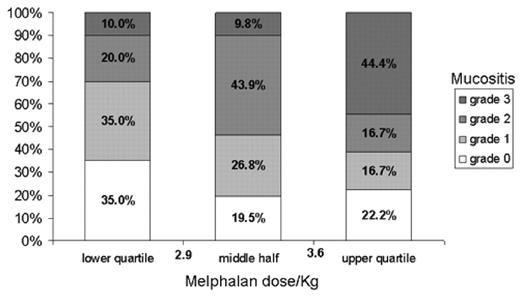Background: High-dose chemotherapy and hematopoietic stem cell (HSC) transplantation is considered standard therapy in patients with chemosensitive relapsed diffuse large B cell lymphoma (DLBCL). BCNU, etoposide, cytarabine and melphalan (BEAM) is a standard widely used DLBCL conditioning regimen. Chemotherapy doses, both standard and high dose, are traditionally based in body surface area (BSA) and are often calculated using the corrected ideal body weight. However, this practice is empirical and the best way to dose chemotherapy is unknown. Weight-based dosing has been suggested to better predict toxicity of the conditioning regimen. We correlate the BEAM dose/actual weight ratio with toxicity and overall outcome in a uniform cohort of patients receiving HSC transplant for relapsed DLBCL
Methods: Retrospective analysis of 80 consecutive patients treated at Mayo Clinic, Rochester, MN between 2001 and 2006 who received a HSC transplant following BEAM conditioning was performed. All doses were based on BSA calculated using the corrected ideal body weight. Weight-based dose intensity was retrospectively calculated utilizing the melphalan dose/Kg as a surrogate for the entire regimen. Weight-based dose intensity was correlated with toxicity in the first 30 days after transplant and survival outcome.
Results: Median age at the time of transplant was 62 (interquartile range 53–65; range 26–77); 65% were males; median number of prior chemotherapy regimens was 2. Median dose of melphalan was 3.2 mg/Kg (interquartile range 2.9–3.6; range 2.2–4.5). Only one patient died within 30 days of the transplant. Patients who received > 3.6 mg/Kg of melphalan were more likely to have Grade 3 or 4 mucositis (44.4% v. 9.8%, P=0.001) than the remaining patients. Median numbers of days spent in the hospital in the first 30 days after transplant was 13 (3–18) for melphalan dose >3.6 mg/kg vs. 7 (0.5–10.5) for the remaining patients (P=0.043). Weight based dose intensity did not correlate with survival (P=0.8) or disease-free survival (P=0.3).
Conclusion: Weight based dose intensity of BEAM correlates with toxicity post autologous HSC transplant. Patients receiving doses corresponding to >3.6 mg/kg of melphalan are at increased risk of high-grade mucositis and prolonged hospitalization.
Disclosure: No relevant conflicts of interest to declare.


